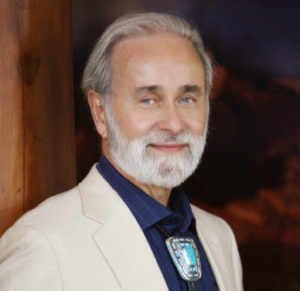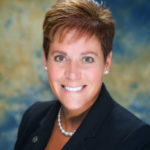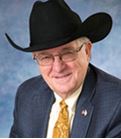Argues greater transparency will allow the public to “know how the college is spending its money, then actions can be taken to eliminate expenditures that are extravagant or unnecessary”
 Third District Paul Chevalier publicly responded to the letter adopted by the Yavapai Community College Governing Board at its Governing Board meeting on September 8 regarding transparency in his individual capacity as the Third District Yavapai Community College Representative. In his response, Chevalier compared the College’s 28 page $84 million budget with entities such as the cities of Cottonwood (budget 310 pages), Prescott (307 pages) and Prescott Valley (309 pages), NAU (187 pages) and others.
Third District Paul Chevalier publicly responded to the letter adopted by the Yavapai Community College Governing Board at its Governing Board meeting on September 8 regarding transparency in his individual capacity as the Third District Yavapai Community College Representative. In his response, Chevalier compared the College’s 28 page $84 million budget with entities such as the cities of Cottonwood (budget 310 pages), Prescott (307 pages) and Prescott Valley (309 pages), NAU (187 pages) and others.
Chevalier claims in his letter that various departments are not transparent in terms of budgets including the department operating the athletic program, tennis court and indoor swimming pool. He claims he has no idea about the individual costs associated with operating each of those programs.
He also raised issues about comparative tax rates and his obligation to protect the public as an elected representative. Rather than elaborate further, you may read his response below for more details.
My Response –Paul Chevalier
Yavapai College Board Member representing District 3.
No doubt my fellow Yavapai College Board members believe the budget the college presents to the Board provides them with sufficient information to make good budget decisions. It does not provide me with enough information to do that – not even close.
Our Yavapai College budget is 28 pages long. Compare this with the other public entities in our County and nearby. Cottonwood’s budget is 310 pages, Prescott’s is 307 pages, Prescott Valley’s is 330 pages, Sedona’s is 390 pages and NAU’s is 187 pages. These are detailed transparent budget. A 28 page budget for an entity with a budget like Yavapai College’s of $84 million dollars can neither be detailed or transparent. It is impossible.
Let’s take the case of Athletics information. ATHLETICS IS NOT EVEN MENTIONED ANYWHERE IN THE YAVAPAI COLLEGE BUDGET. Not one single word or number. That is not transparency. There should be plenty of information in the budget about athletics because Yavapai College sponsors four athletic teams. In addition to the teams we also have a seven court tennis complex recently renovated at a cost in the high 100,000’s of dollars of taxpayer money. It is located in Prescott. Note: Yavapai College does not have a tennis team. These courts are mainly used by Prescott or nearby residents. The same goes for an Olympic swimming pool located on the Prescott, campus. Yavapai College has no swim team. Mainly residents use it. Do we know anything about the cost to the taxpayers of any of this? No. Transparency zero. This is just one example of the lack of transparency in this budget.
Compare Yavapai College’s approach with how NAU addresses the subject of athletics in its budget. NAU has a full page in its budget devoted to athletics’. It separately lists the costs for each team it has, its coaches, its athletic operations cost and other athletics activities and then it goes deeper and breaks down for each team and other activity the various types of cost within that team etc.
Before we go further let me explain one of the reasons why a detailed transparent budget matters. When a Board and the public know how the college is spending its money then actions can be taken to eliminate expenditures that are extravagant or unnecessary. If that information is kept from a Board or the public then such misuses of money will go unknown and unchecked. People in our county have publicly spoken out about our high taxes and some have even come before the Board to do so.
I look at our Yavapai College tax rate versus Maricopa Country Community College’s tax rate and I am baffled. Our tax rate is 50% higher than Maricopa’s. That is a lot of difference. I also have looked at the total budget number of Coconino College versus Yavapai College’s total budget number. Comparing our most recent prepandemic student populations I find that Coconino have 58% of the student hours of Yavapai. One should then expect the Yavapai College budget to be about 42% higher than Coconino’s. But here is the shocker. Coconino’s prepandemic budget for this year was $27.5 million while Yavapai College’s was $84 million – more than three times as high! Why! Unless I can see a detailed transparent Yavapai College budget I will not know and neither will you.
A significant part of my job as a Board member is to protect the public of Yavapai County from over spending by the college that leads to over taxation. Unless and until I am given the opportunity to see a transparent Yavapai College budget I will not able to do that part of my job effectively. My term is for another four plus years. I am not going away and I will continue to pursue this.
 Third District Yavapai Community College representative Paul Chevalier has consistently urged the College to produce a much more detailed, transparent budget to the public. The annual budget is estimated at about $85 million and over 90% of funds come from taxpayers in one form or another.
Third District Yavapai Community College representative Paul Chevalier has consistently urged the College to produce a much more detailed, transparent budget to the public. The annual budget is estimated at about $85 million and over 90% of funds come from taxpayers in one form or another. Prescott criminal defense lawyer Mitch Padilla will join the Yavapai Community College Governing Board in September as the representative from District #5. This District was represented by Steve Irwin who left the seat earlier in 2020 to run for County Supervisor. No one filed for the District #5 position by the deadline other than Mr. Padilla.
Prescott criminal defense lawyer Mitch Padilla will join the Yavapai Community College Governing Board in September as the representative from District #5. This District was represented by Steve Irwin who left the seat earlier in 2020 to run for County Supervisor. No one filed for the District #5 position by the deadline other than Mr. Padilla. The Yavapai Community College Governing Board will have two new members joining it shortly. Absent an unusual happening prior to August 20, data from Yavapai County’s Superintendent’s office (
The Yavapai Community College Governing Board will have two new members joining it shortly. Absent an unusual happening prior to August 20, data from Yavapai County’s Superintendent’s office ( The last regular monthly meeting of the Yavapai Community College District Governing Board until September was held May 12. The scheduled August retreat was scrapped by a 3-1 vote. Although the Governing Board will not convene in a regular monthly session until September, it will, hold a public informational meeting with the College President in mid-July.
The last regular monthly meeting of the Yavapai Community College District Governing Board until September was held May 12. The scheduled August retreat was scrapped by a 3-1 vote. Although the Governing Board will not convene in a regular monthly session until September, it will, hold a public informational meeting with the College President in mid-July. 




 Yavapai Community College District Governing Board Chair, Ray Sigafoos, attended the Association of Community College Leadership Conference in San Francisco in October. Steve Irwin and Deb McCasland also attended the same meeting. The conference is described as “the largest professional development opportunity for community college trustees, presidents, and other thought and policy leaders. . . . Community college leaders … share … experiences and expertise, network with people from around the country and beyond, and expand [their] knowledge of the community college sector.”
Yavapai Community College District Governing Board Chair, Ray Sigafoos, attended the Association of Community College Leadership Conference in San Francisco in October. Steve Irwin and Deb McCasland also attended the same meeting. The conference is described as “the largest professional development opportunity for community college trustees, presidents, and other thought and policy leaders. . . . Community college leaders … share … experiences and expertise, network with people from around the country and beyond, and expand [their] knowledge of the community college sector.” The Yavapai Community College Governing Board will enjoy a nine -week break before its next regular public meeting. The last regular meeting in 2019 was held November 12. It is not scheduled to meet again until January 21, 2019. There are currently no special meetings scheduled during the nine-week lay-off.
The Yavapai Community College Governing Board will enjoy a nine -week break before its next regular public meeting. The last regular meeting in 2019 was held November 12. It is not scheduled to meet again until January 21, 2019. There are currently no special meetings scheduled during the nine-week lay-off. At the November meeting, Third District Yavapai Community College Governing Board member Paul Chevalier continued his effort to encourage greater discussion of important Community College issues among Governing Board members. He argued that if the Board engaged in extended discussion it would be possible to arrive at a consensus on a particular issue.
At the November meeting, Third District Yavapai Community College Governing Board member Paul Chevalier continued his effort to encourage greater discussion of important Community College issues among Governing Board members. He argued that if the Board engaged in extended discussion it would be possible to arrive at a consensus on a particular issue.